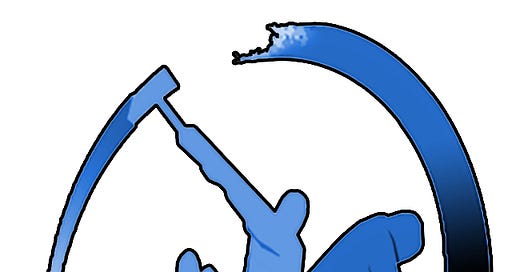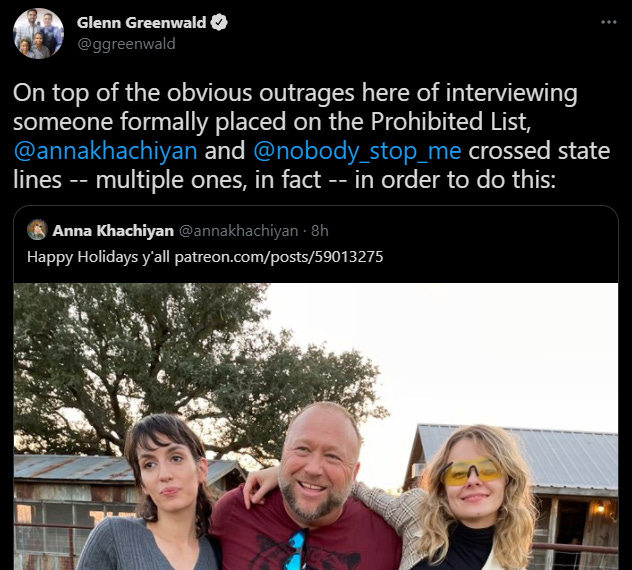Let’s suppose that the standard Republican take about the supposed left-wing bias of MSNBC, CNN, The New York Times, The Washington Post, and so on are true. It’s not — this is a gross simplification that calls liberal orthodoxy “left” and then ignores all of the coverage that doesn’t even meet that standard — but let’s accept it for the sake of argument. Let’s imagine that these outlets are all radical left propaganda organs. Let’s also suppose, to accept another exaggerated claim, that if you depart from this radical left orthodoxy and dare to take a Republican position on anything, you will be blacklisted from this entire ecosystem and that all of these journalists will do everything they can to destroy your reputation. This is a wild overstatement of what actually happens, but for the moment let’s pretend it’s accurate.
Does this mean that your career will be ruined and you will be shut out from society as a pariah? Of course not.
This is because even if we pretend that the radical left dominates the media in the United States, there is still obviously a very large right-wing media market. The right has the most-watched cable news network. The right has a whole galaxy of news outlets, from the WSJ to the Free Beacon to the New York Post to Reason to the National Review to the Daily Wire to the Daily Caller to Newsmax to the Epoch Times to Breitbart to American Greatness to The American Mind to The American Conservative, from nearly all of am political talk radio to the endless parade of individual ventures (Charlie Kirk, Ben Shapiro) to all kinds of dark-money funded ventures (The Federalist, Chronicles) and so on. This of course is just media that is aligned with the GOP more or less explicitly; if we add so-called “independent” outlets and voices (Infowars, Andrew Sullivan) along with “Democrats” that no sane person would consider left-wing, even by US standards (Jonathan Chait, Jennifer Rubin), the right-wing media sphere grows even larger.
If you want to become extremely rich then you probably have a somewhat better shot in liberal media than in right wing media, though the odds of either happening are both of course infinitesimal. If you just want to make a living, however, and perhaps go to the occasional upscale happy hour or land an interview with a famous politician, the chances of making it are probably roughly even. They may even be slightly better on the right, because good jobs on the left are concentrated into a smaller number of large outlets, whereas they seem to be spread across a larger number of small outlets on the right. And while getting a left media gig often demands a prestige degree, knowing someone, and the ability to intern for an extended period of time without pay, the barriers to entry on the right seem to be much lower, particularly given the conscious, systematic efforts the right makes to cultivate and promote new media personalities.
What if you just want to be popular? Well, if you want to be some kind of top-tier A-list celebrity megastar, then sure, liberal media is probably the way to go — though again, as with getting rich, the odds of this happening are tiny even then. But if all you want is a lot of adoring fans, people who will praise you or who will defend you from the critics, and perhaps people who will subscribe to your Substack or Patreon — in that case, it just isn’t plausible to argue that going into left media gives you any clear advantage. If all you want are colleagues who will promote your work and perhaps even help you advance your career, you’ll find plenty of fellow-travelers on the right.
***
Spend five-minutes listening to right-wing media — or for that matter, to some of our ostensibly “independent” media — and you’ll inevitably be told something quite different than what I’ve laid out here. The media, we are told, is so thoroughly dominated by the left that breaking with the left is always an extraordinary risk to one’s career and reputation. For this reason, even the most odious or insane expressions instances of “heterodoxy” can be construed as brave freethinking. A recent tweet from Glenn Greenwald was typical:
Here, Glenn is promoting a guest appearance by conspiracy theorist and recently convicted defamer Alex Jones on the podcast Red Scare. This is indeed something that a lot of liberals and leftists will object to — but why doesn’t Glenn specify that? Why does he refer to “the Prohibited List” as if there is only one?
Anyone who pays any amount of attention to Glenn knows the answer to all of these questions: he has convinced himself that the liberal-left domination of our media and our discourse is so absolute that any divergence from it is a heroic act of freethinking courage. Glenn routinely argues that if you do not adhere to certain liberal-left orthodoxies, it will inevitably ruin your reputation and your career:
I happen to think Glenn’s criticism of the media on Russiagate was generally sound, and that it was indeed unfair and predictable that this would end in his exile from MSNBC and CNN. I also happen to think, unlike some of his critics, that some of his appearances on Fox have been entirely defensible; his appearance on Tucker to pitch a pardon for Edward Snowden, for example, was utterly benign, even if was never likely to succeed.
But let’s not kid ourselves. Bringing a wildly popular figure like Alex Jones onto a podcast with an audience that clearly approves of this sort of thing isn’t a career risk; if anything, it’s likely to bring Red Scare even more attention and more subscribers. Defending Donald Trump (from literally anything) is not going to get you banned from television; if anything, this makes it more likely that you’ll get appearances on Fox News. Doing any of this is obviously going to bring all kinds of aggressive partisan journalists and posters into your Twitter mentions, but if you think this isn’t something that happens when you have a large media profile and say anything political whatsoever, you are living in another universe.
The truly bizarre thing about this rhetoric is that if we take seriously the notion that left heretics get permanently blacklisted and ostracized, it follows directly that pandering to the right is the only option any victimized journalist will have left. This is true even if we (incorrectly) pretend that right-wing career paths and right wing audiences are much, much more limited than those which can be found on the left. If you’ve been booted off of MSNBC and CNN this makes it more likely that you’ll pander to the right, not less! This doesn’t require courage or independent thought, it just demands a minimally self-interested assessment of your remaining options.
***
I’m certain that this paragraph is going to be entirely ignored, but I’ll say it anyway: I am not even remotely suggesting here that our media and our discourse is friendly to heterodox thought. Or that there is not a very clear ideology that both will aggressively enforce, often at great social and financial cost.
In fact, there is a politics for which a lot of these points do hold true: socialism! If you even identify as a socialist, it is vanishingly unlikely that you will be able to make a living working for any media firm, liberal or conservative. Even if you do get a job with one, you will generally not be allowed to make decisively socialist arguments; at best, you will be allowed to say “as a socialist” and then endorse some fairly ordinary progressive position. Today, the socialist boutique media job market almost entirely consists of a few staff positions at Jacobin and a handful of even smaller outlets, along with a relative handful of podcasters, streamers, and bloggers. That’s it.
And of course, if you make standard socialist points about capitalism, you won't just find yourself at odds with partisans on one side of the aisle; you'll run into problems with all of them. Elizabeth Warren may stand and applaud Donald Trump when he says that America will never be a socialist nation, but suggest that this is because they both share the same economic ideology and you'll find yourself faced with an unholy alliance of squishy liberal PMCs and hard right boat dealers.
If you’re looking for a media market without the sort of financial and social incentives that encourage careerism and opportunism, you're never going to find it. But if you’re looking for the one that will win you as little money and popularity as possible, socialism is as good as it gets.













